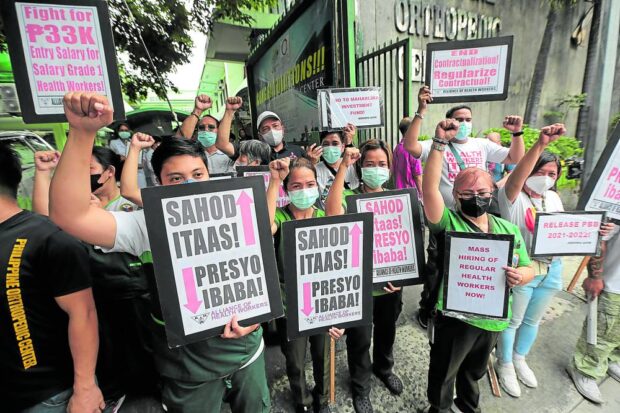Zubiri softens, now open to P100 wage hike

LABOR DEMAND | Employees of hospitals and other medical facilities hold a noise barrage in front of the Philippine Orthopedic Center in Quezon City to demand a higher entry salary for all health workers. (Photo by GRIG C. MONTEGRANDE / Philippine Daily Inquirer)
MANILA, Philippines — Senate President Juan Miguel Zubiri on Monday said he was looking at modifying his proposal for a legislated P100 wage increase instead of the P150 across-the-board hike he had earlier proposed.
Zubiri said he would be willing to modify Senate Bill No. 2002, even if the Senate Committee on Labor had already prepared its report endorsing the P150 daily hike.
“So what we could do is amend it and come up with the committee report, propose a P100 minimum wage increase — an additional minimum wage increase for our workers,” he said in a television interview.
With an adjusted proposal, Zubiri is confident this will quell the objection raised by the business sector, which has led some senators to have qualms about supporting SB 2002.
“Once we do that (reduction in the bill), of course, we will hopefully be able to pass it and have [the] strong support of all our colleagues in the Senate,” he said.
Article continues after this advertisementCloser to P150
The P100 daily wage increase is closer to his original P150 increase, after the regional wage board in Metro Manila approved last week a P40-hike for private workers.
Article continues after this advertisementZubiri conceded that the P40 daily increase for Metro Manila workers was not enough.
“We thank the wage boards for the increase but definitely that is not enough as a P40 increase cannot even buy a kilo of rice because if you go around the markets, one kilo of rice is about P44 to P45 nowadays,” he said.
Citing research and interviews with workers across the country, Zubiri said the country’s labor force would need at least P100 per day for any wage adjustment to “make an impact.”

BETTER SALARY NOW | Healthcare workers from the Philippine Orthopedic Center (POC) and National Children’s Hospital (NCH) hold a noise barrage protest in front of the POC in Quezon City on Tuesday, June 27, 2023, to urge the Marcos administration for a pay hike. (File photo by GRIG C. MONTEGRANDE / Philippine Daily Inquirer)
He expressed optimism that the legislated wage increase of P100 would at least make a dent in the workers’ finances, and they would not need to wait for their regional wage boards to order the pay adjustment in the country’s 16 other regions.
“What is the difference between our laborers in Mindanao, whose minimum wage is between P350 [and] P370, as compared to the laborers in Metro Manila who are getting at least P580 per day, where all the prices of rice [are] the same; the price of electricity is even more expensive?” he said.
According to Zubiri, regional wage boards started going to work only after the Senate began discussions on a legislated wage increase following petitions received from labor groups.